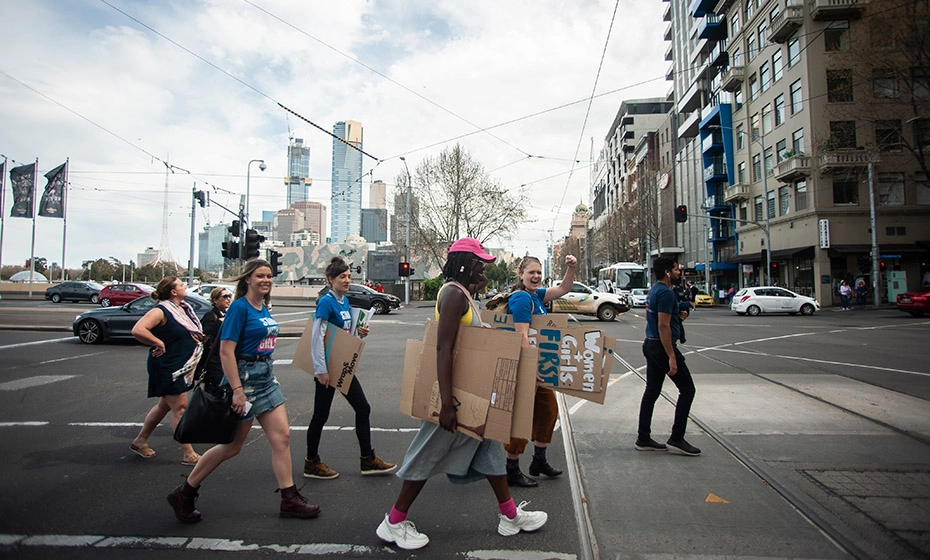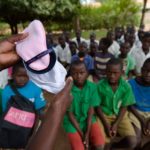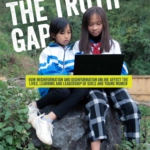Media Centre - 28 September 2021
Australia’s leading child-focussed aid agencies demand more meaningful climate policy involvement for the young people most impacted

Children and young people, including those from the most climate vulnerable countries, are being held back from genuine engagement in climate policy and processes, despite being the generation that will have the most to lose, according to a coalition of Australia’s leading child-focussed humanitarian organisations as the global Youth Climate Summit gets underway today in Milan.
A new paper launched today, ‘A COP fit for children’ – a collaboration by Save the Children, World Vision International, UNICEF, CERI, Plan International, and ChildFund Alliance – sets out the importance of child participation in decisions and summits on climate change, and how the organisers of the UN climate change conference (also known as COP26) and the countries involved in COP can make the climate summit inclusive for all children.
COP26 comes at a critical moment and must accelerate meaningful action towards the goals of the Paris Agreement to ensure global warming does not exceed 1.5 degrees Celsius.
Plan International Australia, UNICEF Australia and Save the Children Australia are today underscoring the urgency of addressing dangerous climate change, by amplifying the voices of children and the world’s most vulnerable people.
The organisations have noted that the communities most affected by the climate crisis have contributed the least to it, and often have the fewest resources to adapt and recover from climate disasters.
The groups further note that climate change is fundamentally a human and child rights issue. It poses an unprecedented threat to the health, education, development, survival and future potential of children across the world.
From Cyclone Yasa which devastated Fiji earlier this year, to the typhoons that have ripped through the Philippines and severe flash floods in Vietnam, every day, our aid workers see the very real and devastating impact of climate change on the world’s most vulnerable people. This includes children, who have contributed least to the crisis but are already bearing the brunt of its impacts.
Yet, children and young people are also at the forefront of climate action and have the potential to play a key part in climate solutions. To do so, they need to be able to meaningfully participate in climate processes. Improving young people’s participation in climate policy processes must centre on four key areas: improving access to information on climate policy processes, delivering climate education and green skills, sharing opportunities and resources, and reducing the gender divide.
“The voices of children and young people – including our nearest neighbours in the Pacific – need to be heard at global events and climate policies and processes. It is critical that they are given the opportunity to participate in these important discussions,” said Susanne Legena, CEO of Plan International Australia.
“We need a meaningful policy to come out of COP26 that includes gender transformative climate change education, so that children and young people are equipped and empowered to take climate action at all levels.
“Global policy-driving events are generally represented by people in privilege anyway, but COVID-19 and travel restrictions have exacerbated this and made it even harder for young people and civic groups from the vulnerable countries most affected by the climate crisis to attend. Their voices must be elevated and amplified to the decision makers.”
Save the Children’s CEO Paul Ronalds said: “Climate change is a child rights emergency of the highest order. The evidence can’t be any clearer that if nations, including Australia, do not work together to put children at the centre of their climate strategies millions will be at risk of serious harm.”
UNICEF Australia CEO Tony Stuart said: “To ensure the genuine participation of young people in future COP processes, we need to include them as part of the official national delegations as a priority. If we want them to be the true agents of climate action, then we can’t afford to leave them sitting on the sidelines.”
Young people from Australia and Asia Pacific demand urgent action
Despite logistical challenges, 15-year-old Melbourne student Ella Simons travelled to Milan yesterday to represent Australia as a Youth Delegate at the Youth Climate Summit, which runs from 28-30 September. She is the youngest representative in attendance.
Ella said: “I feel very lucky to be able to represent young people at the pre-COP event in Milan. We have to use our voice in any way we can, because we can’t vote yet. I want to see our leaders being called out. I want to see them acknowledge the fact that Australia is the second worst country on the list for taking action on the climate crisis. It is key that our leaders hear and listen to us, because we have the most to lose from this crisis. ”
For Tebwebwe, a 20-year-old Plan International youth activist from Eita Village in Kiribati – one of the world’s most vulnerable countries to climate change impacts – rising sea levels, storm surges and flooding have washed away the beaches and villages she grew up in.
“We have seen that some of our plants and produce have some issues because they eventually die out, and even our well-water becomes brackish. And this makes it harder for us young women to bathe in it because it is salty and it is dirty so we cannot take a bath with it. Not only that, the [beaches] we used to play in is now gone because the sea washed it away.
“Our homes and toilets [have been] destroyed and this makes it harder for us because sometimes we skip school attending because we need to rebuild our seawalls and also [essential facilities such as] toilets,” she said.
“We, as children and young people, have an important role in ensuring good climate policies. It is very crucial that we can gain climate-related knowledge and equip ourselves with the skills to raise our voices to hold our leaders to account,” added 15-year-old Dola, 15, a World Vision Program Participant from Bangladesh.
“Children can also come up with innovative solutions considering the climate crisis and environmental sustainability.”
Media contacts


